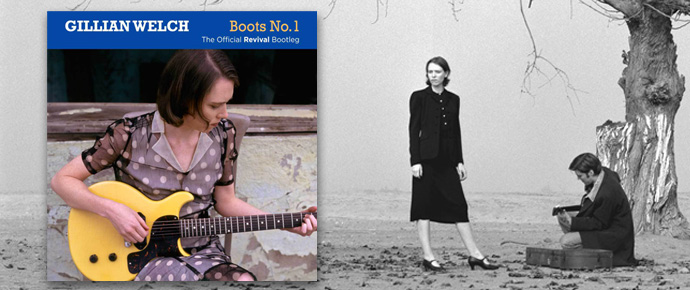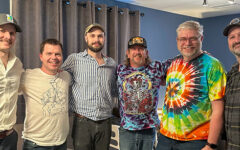
In the perfect vision of hindsight, it’s hard to imagine Gillian Welch struggling to get a foothold in the music business.
It’s also difficult to imagine her performing any kind of music other than the bluegrass-inflected Americana that has made her a household name.
But ponder this: If not for overhearing her college roommate playing a Stanley Brothers recording, Welch might have remained where she was near the beginning of her musical journey – as a drummer in a psychedelic surf band. That accidental discovery a few decades back pushed her to bluegrass, which remains a touchstone.
“The Stanley Brothers records still completely send me,” Welch told me during a meandering chat about songwriting, bluegrass and her newest recording project, Boots No. 1: The Official Revival Bootleg. More specifically, she traces her musical roots to two volumes of live recordings by Ralph and Carter Stanley. “Those recordings are now in me on a genetic level,” she said.
Boots is a two-disc collection of outtakes, alternate versions, and demos of songs that were on or considered for Revival, the Grammy-nominated debut album that she and Rawlings released in April 1996. Eight of the 21 songs are being released for the first time.
Anyone familiar with Welch’s work will find something to like here, including versions of Orphan Girl and Tear My Stillhouse Down that differ from the versions that are part of the roots music soundtrack of the last 20 years. But musicians generally and songwriters specifically are in for a treat. Listen carefully and you can hear Rawlings getting comfortable with the Epiphone archtop guitar that became part of the duo’s signature sound, and you can hear Welch dig in vocally. You can hear songs progress and morph, especially when you add the actual Revival cuts to the listening experiment.
“When we went in to make Revival, I’d barely been in the studio,” Welch recalled. “I had no idea that you picked up a razor blade and sliced tape.” Clearly, she and Rawlings learned a lot in a hurry. After 20 years rushed by – “It’s hard to believe. It’s crazy” – the bootleg collection gives them time to take a breath and reflect.
There’s a music lesson in each cut featured here. But two of my favorites are songs that wound up not making Revival. The first is Red Clay Halo, which later appeared on Time (The Revelator). I found it surprising that such a stellar song didn’t make the cut. The liner notes for Boots suggests that record label Almo Sounds worried that the record “not have too many duets or be ‘too bluegrass.’”
The backstory to my other favorite underscores the patience that comes with being a songwriter. The wait between hearing that your song is being recorded and the recording being released can seem interminable under the best of circumstances.
For Robert Earl Keen and his song Go On Downtown, the wait was more than 21 years. The song, a staple of Welch’s open mic repertoire, was recorded in June 1995, and would have been the only song not written by Welch or Welch and Rawlings on the record. It was the last song omitted from consideration when the artists decided to do all originals. A later attempt to use it as the B side of the British single Pass You By, was aborted when the master tape went missing for a while. Now, finally, Keen gets his cut!
Just as Welch’s love for bluegrass developed from an accidental hearing of the Stanley Brothers, so, too, did the chance to make a record involve a bit of serendipity.
“I didn’t have a record deal, I had a writing deal,” Welch remembered. “When I started these songs, they weren’t really for me. I was trying to write new songs for the bluegrass artists I admired – the Nashville Bluegrass Band, Tim and Molly O’Brien, Del (McCoury). I don’t even think I had Emmylou Harris in mind. That was too lofty.”
Like countless others in Nashville, Welch worked a day job to make ends meet and dreamed of making it big. One day, working as a house cleaner, she wrote Orphan Girl, one her best known songs, in her head. She couldn’t wait to get home and play it for Rawlings and was “pretty upset” when he didn’t say a word after she finished. Later, when she confronted him, he saved the day – and maybe the musical partnership – by noting, “I didn’t say anything because it was perfect.” She laughs about it now, but it’s somewhat comforting for the rest of us to know that she, too, has some vulnerabilities.
She gained some attention by winning the Chris Austin Songwriting Contest at MerleFest. Then, proof that Hollywood endings sometimes happen in real life, Welch and Rawlings did an opening set before Peter Rowan took the stage at the Station Inn. Legendary producer T Bone Burnett happened to be in the audience that night and made a pitch to record them. The rest, as they say, is history.
And, yes, history will repeat. “There will be a Boots No. 2,” Welch said. “It seems like people are interested enough in hearing things from the vault, seeing behind the curtain.”
Boots No. 1 is available from Welch’s own Acony Records and from the usual retail sites.







